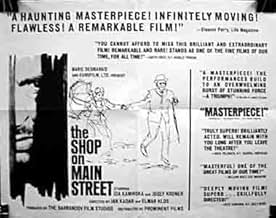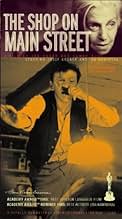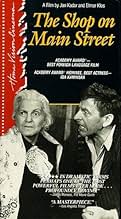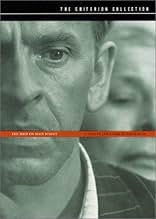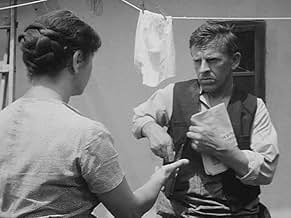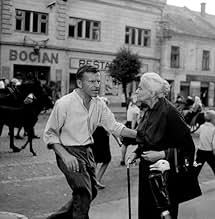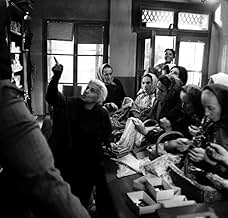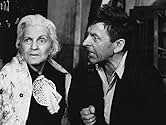Tono Brtko, um camponês, é nomeado inspetor ariano de uma pequena loja comandada por Rozalia, uma viúva judia. Os dois acabam tornando-se amigos, mas é dada a ordem para que os judeus sigam ... Ler tudoTono Brtko, um camponês, é nomeado inspetor ariano de uma pequena loja comandada por Rozalia, uma viúva judia. Os dois acabam tornando-se amigos, mas é dada a ordem para que os judeus sigam para campos de trabalho.Tono Brtko, um camponês, é nomeado inspetor ariano de uma pequena loja comandada por Rozalia, uma viúva judia. Os dois acabam tornando-se amigos, mas é dada a ordem para que os judeus sigam para campos de trabalho.
- Direção
- Roteiristas
- Artistas
- Ganhou 1 Oscar
- 6 vitórias e 4 indicações no total
- Rozalia Lautmannová
- (as Ida Kaminská)
- Markus Kolkocký
- (as Frantisek Zvarík)
- Young Man
- (não creditado)
- Eliasová
- (não creditado)
- Jewish Man
- (não creditado)
Avaliações em destaque
Let's talk visuals.
I just have to say I was blown away by almost every single shot of the movie. The black and white color looks gorgeous, and the indoor shots have lots of shadows and texture. The outdoor shots seem overexposed, brilliant, artificial and almost unbearable. The criterion version just looks superlative.
Watch the dinner scene at the start where the man's brother in law is getting drunk with Tony. They are yelling, and having a time, and the camera dives/sweeps/rapidly turns around and falls. It conveys the dizzying nature of the conversation. The outdoor scenes in the first half of the movie have lots of bustle and activity, with lots of turns and shifts of perspective. People will remember the historical themes, but please don't overlook the amazing cinematography (which rightfully doesn't call attention to itself but enhances the emotional impact of every scene). In one scene (where Person X hits Person Y), camera conveys the claustrophobic, almost paranoiac perspective of Person X and sets the rest of the action up. We just knew what was going to happen next here.
The dream sequences/surreal effects were modest and didn't seem too fantastic; they were small enough for a small man overtaken with fear.
The movie achieves that rarest feat of being able to portray one of the most horrendous experiences in human history without resorting to sensationalism or sentimentality.
The acting of Josef Kroner and Ida Kaminska is without peer and the musical score is quite simply haunting and adds immeasureably to the film's overall effectiveness.
Make every effort to see this true cinematic masterpiece.
There's a whole tradition of political film forced to obscure themes enough to slide them past superficial censors and into the minds of a sometimes discerning audience. It can be done by simply universalizing the themes and parallelling the setting with something the audience could recognize. But Chaplin had explored a different method with The Great Dictator, by finding the similarities between two seemingly opposite figures. Through his critique of Hitler, he took on American pomposity and brutality. It is a particularly effective method as it allows the target no way out, turning its own accusations against itself.
Much has been said about the comedy and tragedy's coexistence in this film, and it is indeed an important facet. The simple reason being that life is both funny and tragic, thus to universalize the themes so that any person can be in the Brtko's place, it is imperative to represent both spheres of life.
But the theme is not limited to a broad contemplation on life in the universal sense. There is a much more devestating critique of all totalitarian ideologies. Brtko begins with a simple and, one could argue, natural sense of survival. He is pushed into greed by his wife, and is then pushed into desperation by the his state-sanctioned duty. He finally arrives into a complete state of terror caused by the irrationality of the events around him, and heightened by his relationship with Mrs. Lautmann. Of course, this kind of degradation could happen just as easily under a communist regime as in the days of the Nazis, and this was what the censors missed and the Academy Awards loved.
Few films have the social significance of this one. Not only for its powerful message, but the fact that it is a glimpse into a world we know little about.
5 out of 5 - Essential
Você sabia?
- CuriosidadesThis movie was shot exclusively in the small Slovak city of Sabinov.
- Erros de gravaçãoSet in 1942, a German troop train moves through the town. The train is carrying Soviet cold-war era trucks and anti aircraft guns that didn't exist until the 1950s. It's understandable for them to make this substitution since any authentic German equipment would have been scrapped long before.
- Citações
Jozef Katz: I don't understand anything any more. But I know one thing. When the law persecutes the innocent, that's the end of it. And those who make the law, too.
- ConexõesEdited into CzechMate: In Search of Jirí Menzel (2018)
- Trilhas sonorasÉn vagyok a falu rossza egyedül
(uncredited)
Written by Lajos Békésy, Imre Garsi and László Patak
Performed by Jozef Kroner, Frantisek Zvarík, Hana Slivková and Elena Zvaríková
Principais escolhas
Detalhes
- Tempo de duração
- 2 h 8 min(128 min)
- Cor
- Mixagem de som
- Proporção
- 1.37 : 1


